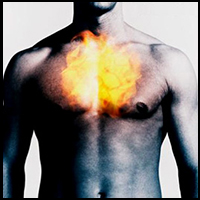Gastritis is a very common problem from which many people who have attained certain age may be forty plus suffer. In this disease the patient may feel inflammation in the lining of his or her stomach. Excess consumption of alcohol is one of the major causes of Gastritis. However, if we go through studies it can be found the other reason can be consumption of non steroidal anti inflammatory drugs like aspirin and ibuprofen. Further, in some cases Gastritis can also occur due to severe injury, infection, and burns. In addition, obese people who have gone through weight loss surgery can also suffer from Gastritis.

If we talk about common symptoms of Gastritis it can be found the patients suffer from stomach upset and at times even severe pain. There can be some other symptoms too like frequent indigestion, nausea, abdominal bloating, and vomiting, which indicate the occurrence of Gastritis. It can be also found patients suffering from acute Gastritis sweat more and their heat beat become fast. In addition, patients might feel like fainting when problem is major. Doctors recommend several tests like blood test, stool test, and other tests to diagnose the disease. It advised to Gastritis patients to avoid junked and spicy foods for relief.
There can be several treatments for the disease but when it come to safe and complete eradication of Gastritis Homeopathy is the best solution. Like other treatments homeopathy leaves no side effect on the body of person being treated. In this regard Vira’s Homeopathy Clinic is offering best treatments for Gastritis. At our clinic doctors do different tests of patients to diagnose the acuteness of the disease before recommending any medicine. Normally, our doctors recommend antacids based medicines to patients. Our homeopathy treatment for Gastritis is safe and reliable, which will show you positive results.
Erosive gastritis is gastric mucosal erosion caused by damage to mucosal defenses. Alcohol consumption does not cause chronic gastritis. It does, however, erode the mucosal lining of the stomach; low doses of alcohol stimulate hydrochloric acid secretion. High doses of alcohol do not stimulate secretion of acid. NSAIDs inhibit cyclooxygenase-1, or COX-1, an enzyme responsible for the biosynthesis of eicosanoids in the stomach, which increases the possibility of peptic ulcers forming. Also, NSAIDs, such as aspirin, reduce a substance that protects the stomach called prostaglandin. These drugs used in a short period of time are not typically dangerous. However, regular use can lead to gastritis.
If the esophageal sphincter fails to do its job properly, some stomach acid can escape up the esophagus. This causes very painful “heartburn” or “gastritis” in the chest as the esophageal walls are eroded by the hydrochloric acid. Chronic gastritis refers to a wide range of problems of the gastric tissues that are the result of H. pylori infection. The immune system makes proteins and antibodies that fight infections in the body to maintain a homeostatic condition. In some disorders the body targets the stomach as if it were a foreign protein or pathogen; it makes antibodies against, severely damages, and may even destroy the stomach or its lining. In some cases bile, normally used to aid digestion in the small intestine, will enter through the pyloric valve of the stomach if it has been removed during surgery or does not work properly, also leading to gastritis. Gastritis may also be caused by other medical conditions, including HIV/AIDS, Crohn’s disease, certain connective tissue disorders, and liver or kidney failure
Severe gastritis is possible when the stomach is viewed without symptoms being present and may be present despite only minor changes in the stomach lining. Seniors have a higher likelihood of developing painless stomach damage. They may have no symptoms at all, such as an absence of vomiting or pain, until they are suddenly taken ill with internal bleeding. Pain in the upper abdomen is the most common symptom. The pain is usually in the upper central portion of the abdomen, the “pit” of the stomach. Gastritis pain can occur in the left upper portion of the abdomen and in the back. The pain seems to travel from the belly to the back. The pain is typically vague, but can be a sharp pain. Belching either doesn’t relieve pain or only relieves it for a moment. The vomit is clear, green or yellow, has a bloody streak in it, or is completely bloody, depending on the severity of inflammation. Bloating and a feeling of fullness or burning in the upper abdomen are also signs of moderate gastritis. Severe gastritis presents pallor, sweating, rapid heart beat, feeling faint or short of breath, severe chest or stomach pain, vomiting large amounts of blood, or bloody or dark, sticky, foul-smelling bowel movements.

